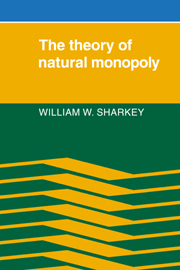Book contents
- Frontmatter
- Contents
- Preface
- 1 Introduction and overview
- 2 Historical survey of natural monopoly
- 3 Natural monopoly and economic theory: some basic results
- 4 Natural monopoly and subadditivity of costs
- 5 Sustainability of natural monopoly
- 6 A game theoretic analysis of destructive competition
- 7 Competition in natural monopoly and natural oligopoly markets
- 8 Noncooperative equilibria in a contestable market
- 9 Natural monopoly and the telecommunications industry
- References
- Index
2 - Historical survey of natural monopoly
Published online by Cambridge University Press: 06 October 2009
- Frontmatter
- Contents
- Preface
- 1 Introduction and overview
- 2 Historical survey of natural monopoly
- 3 Natural monopoly and economic theory: some basic results
- 4 Natural monopoly and subadditivity of costs
- 5 Sustainability of natural monopoly
- 6 A game theoretic analysis of destructive competition
- 7 Competition in natural monopoly and natural oligopoly markets
- 8 Noncooperative equilibria in a contestable market
- 9 Natural monopoly and the telecommunications industry
- References
- Index
Summary
As previously mentioned, the theory of natural monopoly has a long history. Before proceeding to set out in mathematical terms the conditions for that theory, I will survey part of that history in Section 2.1. The purpose of such a survey is twofold. First, it will enable readers to place the present effort in the proper context. Although the theory to be developed in this book is more formal and mathematical than work that has preceded it, many of the important ideas were originally suggested by earlier writers. Second, the literature survey will help those readers who are unfamiliar with the mathematical approach used throughout the volume to understand the most significant concepts.
In addition to the survey, this chapter contains, in Section 2.2, an examination of some recent empirical work that has attempted to test for natural monopoly conditions — primarily economies of scale — in the railroad industry. The major implication of these studies is that the railroad industry is inherently a multiple output industry and that simple measures such as economies of scale are not adequate to answer the relevant policy questions. Much of the complexity in later chapters is due to the need to develop a theory of natural monopoly that is relevant to multiple output firms and markets.
Finally, I will briefly discuss in Section 2.3 the interrelationship between the theory of natural monopoly and the possibility of destructive competition.
- Type
- Chapter
- Information
- The Theory of Natural Monopoly , pp. 12 - 28Publisher: Cambridge University PressPrint publication year: 1982
- 2
- Cited by



